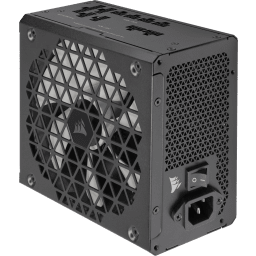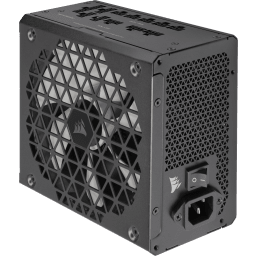BLOG
Best PSU for RTX 3080
The Nvidia GeForce RTX 3080 might not be the most powerful GPU anymore, owing to the 40-series and their upgraded Super variants. However, the RTX 3080 is still a plenty capable GPU, and all the more appealing considering the astronomic cost of the latest GPUs, and the inevitable price drops it’ll receive now that it’s no longer the top dog.
Basically, it’s a good time to get a 3080, but if it’s been a while since your last upgrade, you might need a new PSU, so let’s browse through the comprehensive options here at CORSAIR to find the best PUS for the RTX 3080. But first, a quick sense check to make sure you are at least meeting the bare minimums for the 3080 to work.

RTX 3080 SYSTEM REQUIREMENTS
- PCIe 4.0 X16 Slot (For best performance).
- 750W power supply or greater.
- Minimum 2x 8-pin PCIe connectors + Adapter required or 450W or greater 12HPWR connector. (We make a power bridge to help tidy the notoriously unwieldy 12VHPWR cable, by the way)
RTX 3080 Power Requirements
It’s important to note here that not all RTX 3080s are born the same. While any RTX 3080 will provide almost top tier performance, depending on which brand your 3080 is, there are some differences in the recommended PSU voltage. Below you’ll find a list of some of the more popular RTX 3080s and their power requirements. Be aware that this is not an exhaustive list, so if the RTX 3080 you’re looking at doesn’t appear below, check the manufacturer’s website for its minimum PSU.
| Model | TDP (Thermal Design Power) | Minimum recommended PSU |
| NVIDIA GeForce RTX 3080 (Founder's Edition) | 320W | 750W |
| ASUS TUF Gaming NVIDIA GeForce RTX 3080 OC | 320W | 850W |
| GIGABYTE Gaming OC GeForce RTX 3080 (Rev. 2.0) | 320W | 850W |
| MSI Gaming GeForce RTX 3080 | 370W | 750W |
| ASUS ROG STRIX GeForce RTX 3080 | 320W | 850W |
| GIGABYTE Vision OC GeForce RTX 3080 | 320W | 750W |
| GIGABYTE AORUS GeForce RTX 3080 MASTER | 320W | 850W |
| MSI Ventus GeForce RTX 3080 | 320W | 750W |
| MSI Suprim GeForce RTX 3080 | 370W | 850W |
With the minimum PSUs starting at 750W, and typically topping out at 850W, you’re safe with an 850W PSU. That being said, our recommendations are going to be 1000W, as the additional headroom leaves more room for future upgrades, and will be able to eat any pesky transient power spikes. We’ll have a 750W at the bottom for those who enjoy teetering on the edge of electrical Armageddon.
Best fully modular ATX PSU for RTX 3080: CORSAIR RM1000x SHIFT
Those using a mid or full-tower case like the 4000D or 7000X can enjoy the benefits of a regular-sized ATX PSU, and if you’re balling out with the RTX 3080, then the power-companion of choice can only be the CORSAIR RM1000x SHIFT.
Aside from the niceties like an 80 PLUS Gold efficiency rating and cables fully compliant with the ATX 3.0 and PCIe 5.0 specifications, you get the side-mounted modular cables that earn these PSUs the SHIFT suffix.


CORSAIR RM1000x SHIFT Specs
So, yes, the CORSAIR RM1000x SHIFT is the best PSU for the RTX 3080 as far as the ATX standard goes, but PC people are dorks, so for those people, here’s the power table and cable configuration for this PSU.
CORSAIR RM1000x SHIFT Power Table
| Rail | +3.3V | +5V | +12V | +5VSB |
| Max Load | 25A | 25A | 83.3A | 3A |
| Max combined wattage | 150W | 999.6W | 15W | |
CORSAIR RM1000x SHIFT Cable Configuration
| Cable type | Description | Length | Cable quantity |
| Flat | ATX Cable (24-pin) | 610mm ± 10mm | 1 |
| Flat | EPS / ATX 12V 8-pin (4+4) | 650mm ± 10mm | 2 |
| Flat | 12VHPWR (12+4) pin | 650mm ± 10mm | 1 |
| Flat | PCIe 8-pin (6+2) (6+2) | 750mm ± 10mm | 2 |
| Flat | PCIe 8-pin (6+2) | 650mm ± 10mm | 3 |
| Flat | SATA (4 SATA) | 800mm ± 10mm | 4 |
| Flat | PATA (4-pin) | 750mm ± 10mm | 2 |
Best fully modular SFX PSU for RTX 3080: CORSAIR SF1000L
If you’re limited by desk space, or just like the aesthetic of a compact PC case like the 2000D, then you’ll need an SFX PSU. These are smaller than ATX PSUs, but can be just as efficient, as is the case with the CORSAIR SF1000L.
Additionally, we retain the modular cables here, too. Perhaps all the more important given the super tight space constraints that come with SFX cases. As usual, you’ll find the power table and cable configuration for the SF1000L.


CORSAIR SF1000L Specs
CORSAIR SF1000L Power Table
| Rail | +3.3V | +5V | +12V | +5VSB |
| Max Load | 20A | 20A | 83.3A | 3A |
| Max combined wattage | 150W | 1000W | 15W | |
CORSAIR SF1000L Cable Configuration
| Cable type | Description | Length | Cable quantity |
| Flat | ATX Cable (24-pin) | 300mm ± 10mm | 1 |
| Flat | EPS / ATX 12V 8-pin (4+4) | 400mm ± 10mm | 2 |
| Flat | 12VHPWR (12+4) pin | 400mm ± 10mm | 1 |
| Flat | PCIe 8-pin (6+2) (6+2) | 500mm ± 10mm | 1 |
| Flat | PCIe 8-pin (6+2) | 400mm ± 10mm | 3 |
| Flat | SATA (4 SATA - Straight) | 445mm ± 10mm | 1 |
| Flat |
SATA (4 SATA - Right)
|
445mm ± 10mm | 2 |
| Flat |
PATA (4-pin)
|
330mm ± 10mm | 1 |
Best ultra-low noise ATX PSU for RTX 3080: CORSAIR HX1000i
While all the options on this list have a zero-RPM mode, so that the fan won’t even spin below a certain limit, there is some inevitable noise when the PSU properly kicks in. If you’re a sonically sensitive sort, then the CORSAIR HX1000i is the correct way to go. This one is even 80 PLUS Platinum rated. Here’s the power table and cable configuration for this silence-serving savage.


CORSAIR HX1000i Specs
CORSAIR HX1000i Power Table
| Rail | +3.3V | +5V | +12V | +5VSB |
| Max Load | 20A | 20A | 83.3A | 3A |
| Max combined wattage | 150W | 1000W | 15W | |
CORSAIR HX1000i Cable Configuration
| Cable type | Description | Length | Cable quantity |
| Flat | ATX Cable (24-pin) | 610mm ± 10mm | 1 |
| Flat | EPS / ATX 12V 8-pin (4+4) | 650mm ± 10mm | 2 |
| Flat | 12VHPWR (12+4) pin | 4650mm ± 10mm | 1 |
| Flat | PCIe 8-pin (6+2) (6+2) | 775mm ± 10mm | 2 |
| Flat | SATA (4 SATA - Straight) | 800mm ± 10mm | 1 |
| Flat |
PATA (4-pin)
|
750mm ± 10mm | 1 |
| Round |
USB (TYPE C)To 10-1 Pin
|
525mm ± 25mm | 1 |
Best 750W PSU for RTX 3080: CORSAIR RM750x SHIFT
We mentioned at the outset that you’re just about safe with a 750W PSU, at least for the FE 3080, perhaps 850W for the other brands. So, if you’re happy with riding the line on the very edge of the bare minimum, it must be the RM750x SHIFT.


Given that the power requirements for 3080 cards swing from 750W to 850W, it’s worth mentioning that the there’s an 850W version within the SHIFT PSU lineup, too.
CORSAIR RM750x SHIFT specs
CORSAIR RM750x SHIFT power table
| Rail | +3.3V | +5V | +12V | +5Vsb |
|---|---|---|---|---|
| Max Load | 20A | 20A | 20A | 3A |
| Max Combined Wattage | 150W | 750W | 15W | |
CORSAIR RM750x SHIFT Cable Configuration
| Cable Type | Description | Length | Cable Quantity |
| Flat | ATX CABLE 24-PIN (24) | 610mm ± 10mm | 1 |
| Flat | EPS/ATX12V CABLE 8-PIN (4+4) | 650mm ± 10mm | 2 |
| Flat | 12VHPWR Cable (12+4) | 650mm ± 10mm | 1 |
| Flat | PCIe CABLE 8-PIN (6+2) x2 | 750mm ± 10mm | 2 |
| Flat | PCIe CABLE 8-PIN (6+2) | 650mm ± 10mm | 3 |
| Flat | SATA CABLE (4 SATA) | 800mm ± 10mm | 4 |
| Flat | PATA CABLE (4-PIN) | 750mm ± 10mm | 2 |
There ya go, folks. All the best PSUs for the RTX 3080 all in one place, depending on your individual needs. For more PSUs, plus basically everything else than goes into a PC, head to our webstore.
RTX 3080 PSU FAQs
That's 4 of the best PSU options for the RTX 3080. Below, we've included a answers to a few of the most common PSU questions, in case you want some more specific information.
How long is the warranty on a CORSAIR PSU?
All our PSUs come with a minimum of a 3-year warranty, with many holding 10-year warranties. You can find the warranty for each specific PSU on our support site.
Are there still issues with the 12VHPWR connector?
Following the release of the 12VHPWR standard, there were some incidences of the connector melting, due to it not being fully-seated when connected. This is avoidable, just make sure the cable is fully connected at both ends, and avoid bending the connector during the cable management process. Our PCIe 5.0 12VHPWR GPU Power Bridge can help with that, allowing for neater cable management, and a lower likelihood of the cable being bent too much. (Just check it will work with your specific RTX 4080.)
What do the "80 Plus" and "Cybenetics" symbols mean?
80 PLUS and Cybenetics are the two most common PSU efficiency ratings. Basically the better the rating, the more efficient the power supply. We've written an article explaining these two standards that you can read for more detail.
Are all PSU cables compatible with all PSUs?
No. there are different standards and connector types at play here. This means you have to be very careful. Check out our compatibility matrix to make sure. Plugging the wrong type of cable into your PSU, or any other component in your system can have disastrous consequences.
Try Our Power Supply Calculator
Still not sure which power supply is right for you? Why not try out our Power Supply Calculator. Just choose your components and we will calculate the best PSU for your specific pc setup.
المنتجات في المقالة










